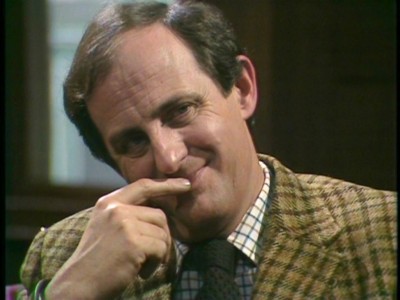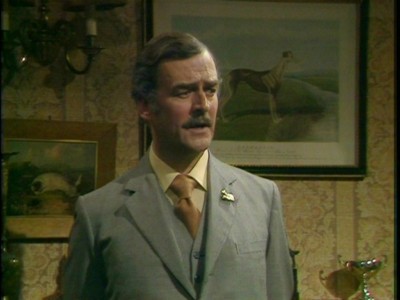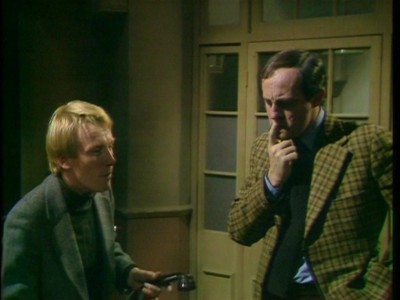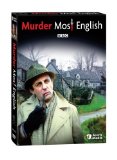| Reviews & Columns |
|
Reviews DVD TV on DVD Blu-ray 4K UHD International DVDs In Theaters Reviews by Studio Video Games Features Collector Series DVDs Easter Egg Database Interviews DVD Talk Radio Feature Articles Columns Anime Talk DVD Savant Horror DVDs The M.O.D. Squad Art House HD Talk Silent DVD
|
DVD Talk Forum |
|
|
| Resources |
|
DVD Price Search Customer Service #'s RCE Info Links |
|
Columns
|
|
|
Murder Most English
Acorn Media has released Murder Most English, a three-disc, four film collection of BBC television mysteries based on the "Flaxborough" novels by cult British author, Colin Watson. Produced in 1977, these four mysteries star celebrated British character actor Anton Rodgers as the low-key yet dogged Detective Inspector Purbright, who, along with sunny Detective Sergeant Love (Christopher Timothy), politely pick their way through the surface conventions and niceties of the backwater eastern England small town to discover the origins of the far more bizarre and interesting underworld that exists beneath the quaint façade of a small English country town. TV fans of all things British and of course, mystery afficionados might find Murder Most English to their liking.

In the small eastern English country town of Flaxborough, Detective Inspector Purbright (Anton Purbright) finds himself repeatedly mired in deceptively simple cases of murder - which turn out to have rather complicated motivations - all of which eventually boil down to one common denominator: money. Attired in comforting tweed jackets and cloth caps, and always with his pipe reassuringly puffing away, Purbright, on the surface, is seemingly the clichéd picture of a rural copper who fancies himself the star of his own series of detective novels. However, his tweeds and pipe aren't affectations, but merely extensions of his own quiet, sensible, mild-mannered approach to his duties. And beneath that blank exterior that his foes mistakenly take for an unimaginative, plodding nature, is a keen criminologist with a surprisingly dense intellectual base that repeatedly catches his suspects - and his colleagues - off-guard (his aristocratic superior, Chief Constable Chubb, played by Moray Watson, says admiringly - and somewhat nervously: "You know, Purbright, you really are far too sophisticated to be a policeman."). Fulfilling the requirements of sidekick and legman, Detective Sergeant Love (Christopher Timothy) frequently amuses Purbright with his naivete and general squeamishness about the job ("I can't stand human remains," he states at one point), while sensible but removed Sergeant Malley (John Comer) provides some off-subject comments that nevertheless lighten the mood.
SPOILERS ALERT!
I can't say I've ever read any of Colin Watson's "Flaxborough" mysteries featuring the retiring, even-tempered D.I. Purbright, so I can't comment on how faithful these adaptations from 1977 are to their original source material. A brief bit of research didn't turn up much on the author or the novels, either (apparently, Watson, who died in 1983, was well-regarded by other authors and critics, but he wasn't a "superstar" of the genre in terms of public recognition). What did come through, though, was the idea that Watson created a realistic, three-dimensional space in which his detective could operate, a fictional Flaxborough that provided not only the societal forces that created tensions between the classes (and which spurred the crimes), but also subtle commentary on the state of England as time progressed during the publication of his twelve "Flaxborough" novels.
Unfortunately, that sense of place and community is not present in these TV adaptations (and therefore, the series' failure to bring the town to life might prove to be a bigger disappointment to those fans who have already read the books). As entertainingly drawn as the characters are here, I didn't get a feel at all for "Flaxborough" as an identifiable entity, and indeed, a separate "character" that enlarged the subtexts of the mysteries. The settings for the mysteries by and large are conveyed through obvious studio interiors, and what exterior location shootings are featured, are relatively undistinguished. I never felt, watching Murder Most English, that I was "taken away" to a distinct place that harbored a subset of people worthy of examination and commentary (unlike the superior Midsomer Murders, where most episodes feel like they take place in a fantastical, murderous county that just might be real, if you accidentally strayed off the map on your travels). From a technical standpoint, it doesn't help that the mysteries stay indoors most of the time, while the location shooting is a mixture of cheap video and grungy 16mm footage that can only spell "British TV from the 1970s." Flaxborough as an intriguing place never became fixed in my mind.
Distressingly, the direction by Ronald Wilson is as unimaginative as the resulting visual scheme of Murder Most English. This is slow goings at times, which, as I understand from my research, was a trademark of Watson's novels. But a deliberate style that works in literary form doesn't necessarily ensure a successful transition to film, particularly if the direction of that film is as lackluster and frankly boring as it is here. Wilson, a veteran of British TV, can't seem to move the camera to save his life, as he parks the lens in front of the actors' head and shoulders, and grinds away. Individual scenes lack any sense of pace or rhythm (unless supplied by the terrific actors' own deliveries), and everyone's low-key delivery, while oftentimes funny and smart, doesn't help the tempo. Adapted by British TV vet, Richard Harris, the scripts are quite funny - at times - but one wonders how much of that humor was directly taken from Watson's novel (which of course begs the question: why watch substandard adaptations, when you can read the "real" thing?).
What does work exceedingly well in the four films of Murder Most English are the marvelous character actors that populate these mysteries. Certainly Rodgers, who had a long and distinguished career in film, television and stage, is deft and amusing as the seemingly mundane Purbright. That kind of self-effacing character can be a trap for an actor who either tries to find small-scale quirks and tricks to enliven the part (and thereby deliver a gimmicky characterization), or so low-balls it as to make the character invisible and uninteresting. Rodgers does neither, and manages to come up with a thinking man's copper who sports a bemused attitude towards the hypocrisies and ironies he sees at play at almost every level of society. Timothy doesn't have a terribly difficult character to mount (not too unlike his central role in All Creatures Great and Small), but he does so with a fair amount of enthusiasm and sunny/funny good cheer. I particularly liked Moray Watson as Purbright's aristocratic superior, who doesn't seem to have an office (Purbright always meets him at his estate), and who warily admires Purbright's deductive skills...while wondering if they might upset the applecart of the strict societal bounds of the Flaxborough classes. Brenda Bruce is quite interesting as Lucilla Teatime, apparently a favorite character of Watson's readers. But her character is so shadowily developed here that her obvious delight in playing Lucilla is tempered by the clumsiness of the character's utilization.

Here are the four mysteries (split up into two parts, about 48 minutes each) included in the three-disc set Murder Most English, as described on the back of their slimcases:
DISC ONE
Hopjoy Was Here (Part 1)
When an intelligence agent with an eye for the ladies and a growing list of creditors goes missing, DI Purbright and DS Love seek to find out why. Has Hopjoy been killed by a vengeful husband or an enemy spy - or might he have staged his own disappearance? The inspector focuses his attention on a newlywed couple who knew Hopjoy well: one was his friend and landlord, the other his former fiancee.
Hopjoy Was Here (Part 2) / Lonelyheart 4122 (Part 1)
Just as the Hopjoy case is solved, so another begins when two local women go missing. Both recently joined a matchmaking agency where, as women of means, they would not only be good catches for suitable men but also possible victims of a dangerous predator.
Lonelyheart 4122 (Part 2)
A new arrival in town signs up with the matchmaking agency and begins corresponding with Lonelyheart 4122. DI Purbright warns her that a con man may be using the agency to prey on women. The wide-eyed Miss Teatime is unfazed, however, and soon unveils a few tricks of her own.
DISC TWO
The Flaxborough Crab (Part 1)
Something is bringing out the worst in the old men of Flaxborough, and they're taking it out on the ladies of the town, young and old alike. Women aren't safe anywhere - in church, on the street, in the countryside, even in their own homes. Could this "excess of virility" really be the result of an herbal remedy favored by the seniors?
The Flaxborough Crab (Part 2)
DS Love visits Moldham Meres, the faux monastic operation that concocts the herbal brew - and finds that the managing director is none other than Lucilla Teatime. Her business competitor is a German-based drug corporation that is targeting the geriatric market. As big pharma demonstrates the deadly lengths to which it will go, the redoubtable Miss Teatime again shows the ruthless side of her own nature.
DISC THREE
Coffin, Scarcely Used (Part 1)
The funeral of Councilor Carobleat is attended by four of Flaxborough's leading citizens - newspaper owner, doctor, undertaker, and lawyer - and followed by a strange course of events. The councilor's will leaves his estate to the newspaperman, who is subsequently found electrocuted after a late-night meeting with the other three. Purbright suspects murder by conspiracy.
Coffin, Scarcely Used (Part 2)
The conspiracy deepens when another of the "gang of four" is stabbed to death. As Purbright closes in on the lucrative racket they have been running, the remaining two vanish. Can the inspector unearth the startling truth before it slips through his fingers?

The DVD:
The Video:
Acorn has put a disclaimer on this edition of Murder Most English: "Due to the age of these programs and the improved resolution that DVD provides, you may notice occasional flaws in the image and audio on this DVD presentation that were beyond our ability to correct from the original materials." Actually, although I did notice the usual anomalies associated with British TV productions from this time period (dropout, flaring, video noise, washed-out colors, soft picture), I didn't see anything much worse than I've encountered in other Acorn releases of a similar nature. Any fan of these types of shows knows exactly what to expect from these DVD transfers, so it's not a big surprise.
The Audio:
Same with the audio. The Dolby Digital English mono soundtrack is entirely in keeping with these kinds of releases. There's a little bit of hiss, but overall - everything is heard clearly. English subtitles are available.
The Extras:
There are no extras for Murder Most English.
Final Thoughts:
Maybe the time is right for a remake. As it stands, the four mysteries in the Murder Most English "Flaxborough Chronicle" set are well-acted, and amusing a fair amount of time. But the direction is unimaginative and deadly dull, and the pace is cripplingly slow. A rental would be prudent for fans of this type of fare (of which I count myself), but newcomers probably won't be interested.
Paul Mavis is an internationally published film and television historian, a member of the Online Film Critics Society, and the author of The Espionage Filmography.


|
| Popular Reviews |
| Sponsored Links |
|
|
| Sponsored Links |
|
|
| Release List | Reviews | Shop | Newsletter | Forum | DVD Giveaways | Blu-Ray | Advertise |
|
Copyright 2024 DVDTalk.com All Rights Reserved. Legal Info, Privacy Policy, Terms of Use,
Manage Preferences,
Your Privacy Choices | |||||||












